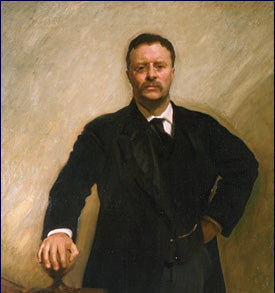
The 1910 Diplôme des Débrouillards Award
On November 10, 1910, Pierre de Coubertin, founder of the modern Olympic Games, awarded Theodore Roosevelt the Diplôme des Débrouillards, an honor recognizing versatility, resilience, and athleticism.
Roosevelt and the Spirit of Self-Reliance
This was no ordinary recognition. The Société des Sports Populaires, a French organization Coubertin had founded to promote physical education and self-reliance, normally awarded the diploma only to young men who had proven their ingenuity, adaptability, and athletic ability. But for Roosevelt, Coubertin made an exception:
“I beg to present you with this Diploma—the same which we give to our young ‘débrouillards’ and the only one which was ever conferred without examination. But the Council… considered that Mr. Roosevelt had made it clear to everybody that he was capable of doing ‘all that and much more.’”
A lifelong advocate of the strenuous life, Roosevelt responded:
“I am greatly pleased to receive your letter, and beg to express my profound acknowledgment of the honor conferred upon me in awarding me the Diplôme des Débrouillards.”
Coubertin’s Vision: A Débrouillard Movement in America
For Coubertin, who had recently resurrected the Olympic Games, this was more than a symbolic gesture. In his letter, he explicitly expressed his hope that the Débrouillard Movement, already establishing momentum in Europe, would expand to the United States:
“I think the Débrouillard movement, which has already taken root in several European countries, is an up-to-date movement, and I hope some American branch may come out some day.”
Coubertin saw the débrouillard as the ideal citizen of a rapidly changing world, able to adapt, innovate, and overcome obstacles with skill and confidence. As he described in Le Figaro in 1902:
“A boy who is dexterous with his hands, quick to exert himself, flexible of muscle, resistant to fatigue, with a quick eye, a firm decision, and trained in advance for those changes of place, profession, situation, habits, and ideas made necessary by the fertile instability of modern civilizations.”
Roosevelt personified this definition. He overcame personal tragedies through grit and physical challenges to become an explorer, soldier, statesman, and conservationist. Roosevelt embodied Coubertin’s vision as a charismatic leader who valued self-discipline, physical vitality, and national resilience.
Débrouillard Remains a Timeless Ideal for America
Though overshadowed by World War I, the Débrouillard Movement did not disappear. Instead, Coubertin embedded it into the Olympic Games through the Modern Pentathlon, introduced in 1912 as the only sport specifically designed for the Olympic program.
More than a competition, it is a direct extension of the débrouillard philosophy, an institutionalized sport of resourcefulness, athletic completeness, and problem-solving under pressure. Recognizing that the débrouillard spirit was essential for modern life, Coubertin ensured its survival by merging the Débrouillard Movement into his Olympic Movement, where adaptability would be tested on the world’s greatest stage.
Designed to test an athlete’s ability to adapt and overcome, the Modern Pentathlon required skill in fencing, swimming, equestrian show jumping, pistol shooting, and cross-country running. In 2025, the Modern Pentathlon will evolve again, integrating Ninja obstacle course racing to further test versatility in a rapid and exciting 90-minute format.
While the formal movement faded, its spirit remains alive. Every Modern Pentathlete carries forward the same mindset that defined Roosevelt and the débrouillards before him, the ability to thrive in uncertainty, meet challenges head-on, and rely on ingenuity rather than rigid specialization.
Roosevelt himself captured this essence best:
“Do what you can, with what you have, where you are.”
Coubertin saw Roosevelt as proof that America already embodied the débrouillard mindset. The question is not whether the philosophy belongs in America. It always has. The real question is whether we still recognize its value today.
A débrouillard does not just overcome obstacles.
A débrouillard is capable of handling whatever comes next.



Leave a comment